Understanding the distinction between morals and values is essential for personal transformation. This article explores how these concepts influence mind-body practices, including meditation and yoga, and bio-hacking strategies for growth. It examines the benefits of these practices on self-awareness and emotional regulation while highlighting rare techniques that enhance transformation. Additionally, it discusses the importance of aligning bio-hacking methods with personal ethics and integrity for a holistic approach to personal development.
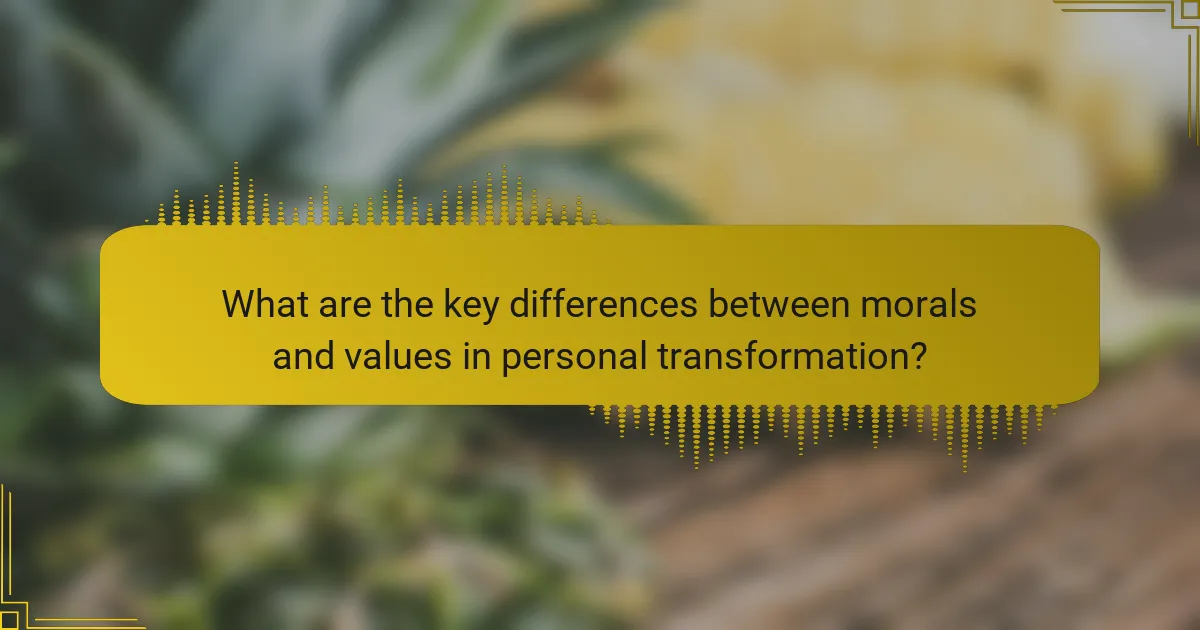
What are the key differences between morals and values in personal transformation?
Morals and values differ significantly in personal transformation. Morals are societal standards of right and wrong, while values are individual beliefs guiding behaviour. Understanding this distinction enhances mind-body practices and bio-hacking strategies for personal growth. Morals often stem from cultural influences, shaping ethical frameworks. In contrast, values are deeply personal, reflecting individual priorities and motivations. This unique attribute of values makes them crucial in tailoring personal transformation approaches, leading to more effective outcomes. Recognising how these elements interact can empower individuals to align their practices with their true selves, fostering deeper transformation.
How do morals influence mind-body practices?
Morals significantly shape mind-body practices by guiding individuals in their pursuit of personal transformation. They influence choices in techniques, such as meditation and yoga, ensuring alignment with ethical beliefs and values. For instance, a commitment to compassion may lead one to practice mindfulness to enhance empathy. Additionally, moral frameworks can dictate the acceptance of bio-hacking methods, as individuals weigh the ethical implications of altering their bodies for improvement. Ultimately, morals act as a compass, steering practitioners toward methods that resonate with their core beliefs and promote holistic well-being.
In what ways do values shape bio-hacking approaches?
Values significantly shape bio-hacking approaches by guiding ethical considerations and personal motivations. They influence choices regarding practices, technologies, and lifestyle changes adopted for self-improvement. For instance, individuals prioritising sustainability may opt for eco-friendly supplements, while those valuing efficiency might focus on data-driven methods. This alignment of values with bio-hacking strategies fosters a more personalised and meaningful transformation journey.
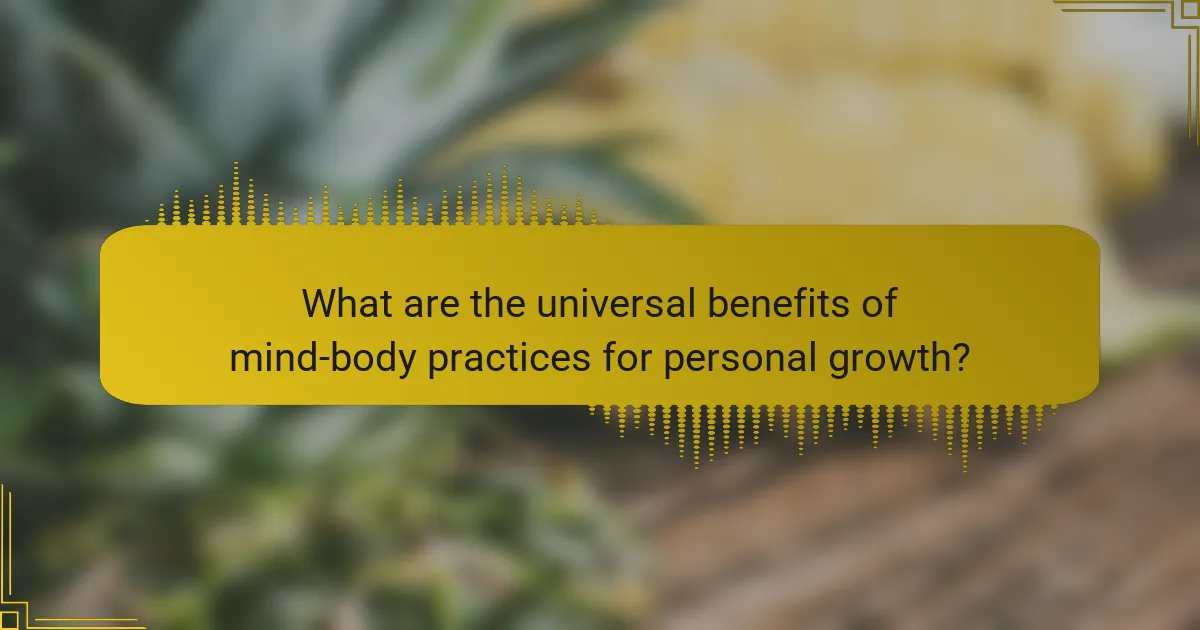
What are the universal benefits of mind-body practices for personal growth?
Mind-body practices offer universal benefits for personal growth, including enhanced self-awareness, emotional regulation, and improved resilience. These practices foster a deeper connection between mind and body, promoting mental clarity and emotional stability. Regular engagement in such activities can lead to significant transformations in personal values and moral perspectives. As a result, individuals often experience increased motivation and a greater sense of purpose in life.
How do mind-body practices enhance mental well-being?
Mind-body practices significantly enhance mental well-being by promoting emotional balance and reducing stress. Techniques like meditation and yoga foster mindfulness, leading to improved mood and resilience. Research indicates that regular practice can decrease anxiety levels by up to 40%. Additionally, these practices encourage self-awareness, which is crucial for personal transformation. Engaging in such activities not only cultivates a sense of inner peace but also strengthens the mind-body connection, ultimately contributing to overall mental health.
What physical health improvements can be achieved through these practices?
Mind-body practices and bio-hacking can lead to significant physical health improvements. These practices enhance physical fitness, increase energy levels, and boost immune function.
For example, mindfulness meditation lowers stress, which can reduce blood pressure and improve cardiovascular health. Yoga improves flexibility and strength, while bio-hacking techniques like intermittent fasting can aid weight management and metabolic health.
Moreover, consistent engagement in these practices fosters overall well-being, promoting a healthier lifestyle. The unique attribute of personalised bio-hacking allows individuals to tailor their approaches, maximising physical health benefits specific to their needs.
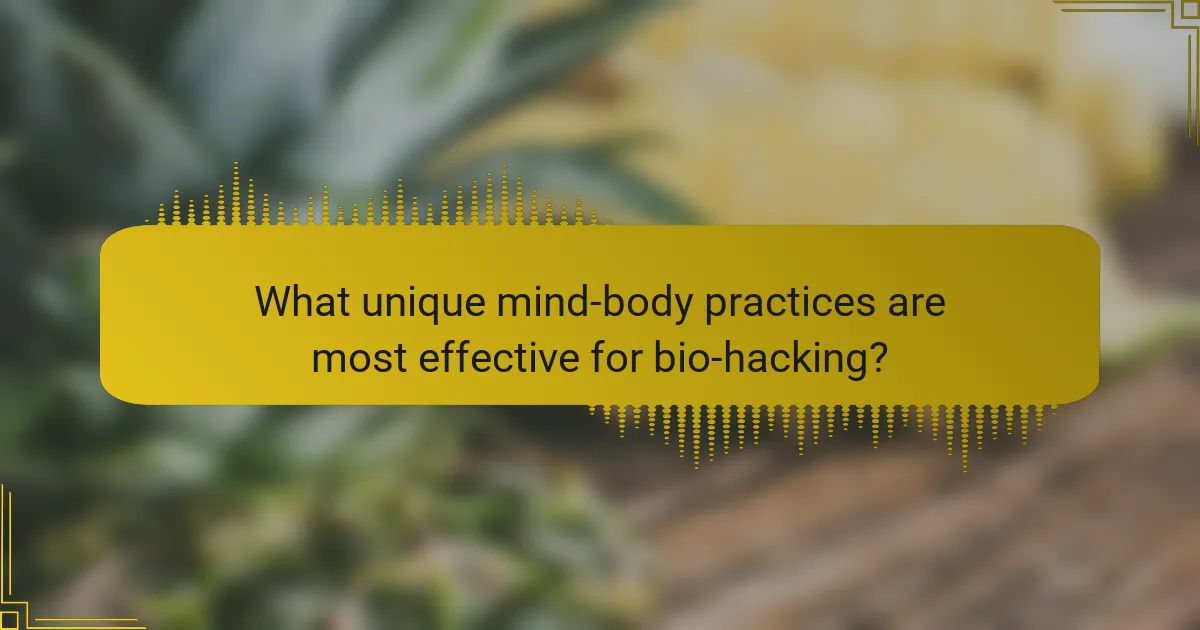
What unique mind-body practices are most effective for bio-hacking?
Mind-body practices that effectively support bio-hacking include meditation, breathwork, and yoga. These techniques enhance mental clarity and physical health, enabling personal transformation.
Meditation improves focus and emotional regulation, while breathwork enhances oxygen flow and reduces stress. Yoga combines physical movement with mindfulness, promoting overall well-being.
Research indicates that consistent practice of these methods can lead to increased resilience and improved cognitive function. Integrating these unique practices into daily routines can significantly enhance bio-hacking efforts.
How does yoga contribute to bio-hacking for personal transformation?
Yoga enhances bio-hacking for personal transformation by promoting mental clarity, physical health, and emotional balance. It fosters self-awareness and resilience, key components for optimising personal performance. Regular practice can lead to improved stress management and cognitive function, facilitating deeper insights into one’s habits and behaviours. This holistic approach aligns with bio-hacking principles, allowing individuals to tailor their wellness strategies effectively.
What role does meditation play in optimising mental performance?
Meditation significantly enhances mental performance by improving focus, reducing stress, and fostering emotional regulation. Regular practice cultivates mindfulness, which sharpens cognitive abilities and decision-making skills. Studies show that individuals who meditate exhibit increased grey matter density in brain regions associated with memory and learning. This unique attribute of meditation promotes greater mental clarity and resilience, essential for personal transformation.
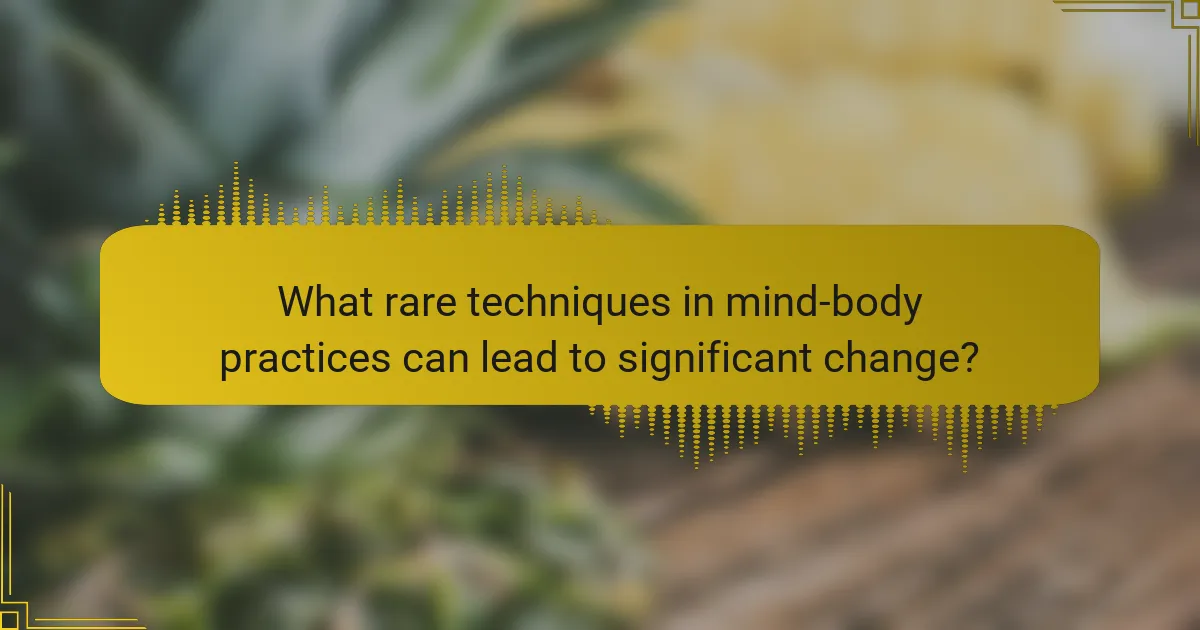
What rare techniques in mind-body practices can lead to significant change?
Rare techniques in mind-body practices can lead to significant change by enhancing self-awareness and emotional regulation. Techniques such as breathwork, sensory deprivation, and neurofeedback offer unique pathways for transformation. Breathwork facilitates deep emotional release and stress reduction, while sensory deprivation enhances introspection and clarity. Neurofeedback trains the brain for improved focus and emotional stability. These rare methods, often overlooked, provide powerful tools for personal growth.
What are the lesser-known bio-hacking methods that enhance resilience?
Lesser-known bio-hacking methods that enhance resilience include practices like breathwork, cold exposure, and neurofeedback. These techniques improve mental and physical fortitude. Breathwork regulates stress responses, while cold exposure boosts mood and immune function. Neurofeedback trains brain activity for improved focus and emotional regulation.
How can breathwork be used as a unique bio-hacking tool?
Breathwork serves as a unique bio-hacking tool by enhancing mental clarity and emotional resilience. It manipulates breath patterns to influence physiological states, promoting relaxation and stress reduction. This practice can increase self-awareness, leading to transformative personal insights. Regular breathwork may also improve physical health by optimising oxygen flow and reducing tension, making it a valuable component of a holistic bio-hacking strategy.
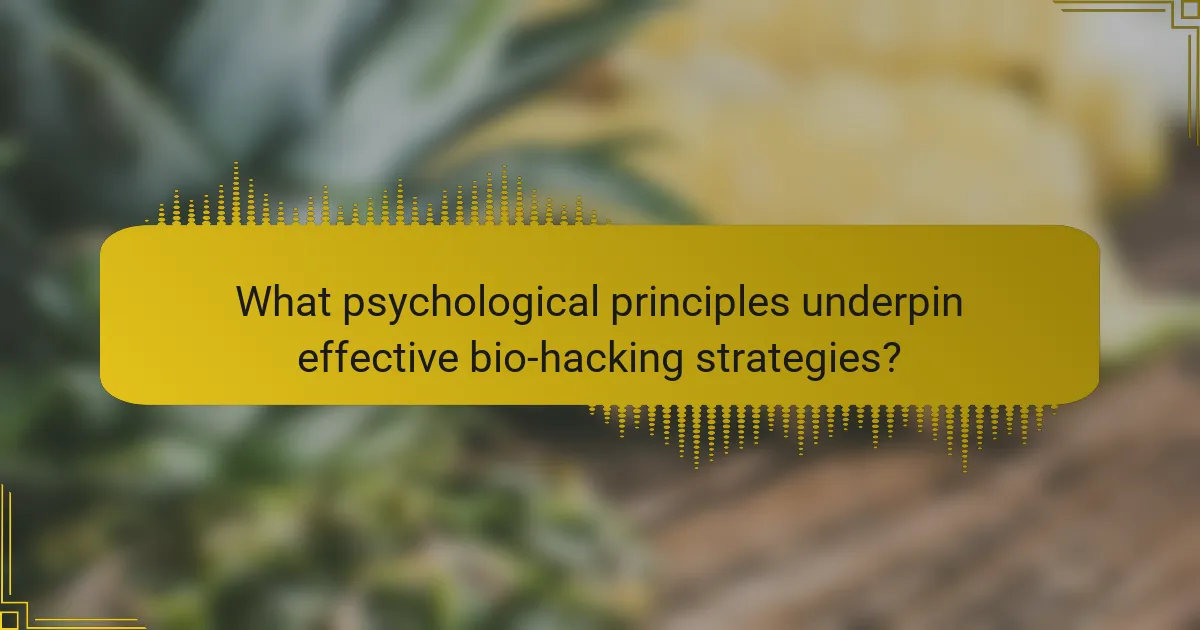
What psychological principles underpin effective bio-hacking strategies?
Psychological principles that underpin effective bio-hacking strategies include self-efficacy, motivation, and cognitive behavioural techniques. Self-efficacy influences individuals’ belief in their ability to achieve personal transformation through bio-hacking. Motivation drives the pursuit of goals, while cognitive behavioural techniques help in reshaping thought patterns to support bio-hacking practices. These principles create a framework for individuals to leverage mind-body practices effectively.
How does cognitive behavioural therapy integrate with mind-body practices?
Cognitive behavioural therapy (CBT) integrates with mind-body practices by addressing thoughts and emotions to influence physical health. This synergy enhances personal transformation by promoting holistic well-being. CBT’s structured approach complements techniques like mindfulness and yoga, which foster self-awareness and emotional regulation. As a result, individuals experience improved mental clarity and reduced stress, facilitating lasting change. This combination exemplifies a unique attribute of modern therapeutic practices, emphasising the interconnectedness of mind and body for optimal health outcomes.
What psychological barriers must be overcome for successful transformation?
Overcoming psychological barriers is essential for successful transformation. Key barriers include limiting beliefs, fear of change, and lack of self-efficacy. Limiting beliefs hinder progress by creating a fixed mindset. Fear of change often stems from uncertainty about outcomes, preventing individuals from embracing new practices. Lack of self-efficacy diminishes motivation, making it challenging to pursue mind-body practices or bio-hacking techniques. Addressing these barriers through self-reflection and supportive environments can facilitate personal transformation.
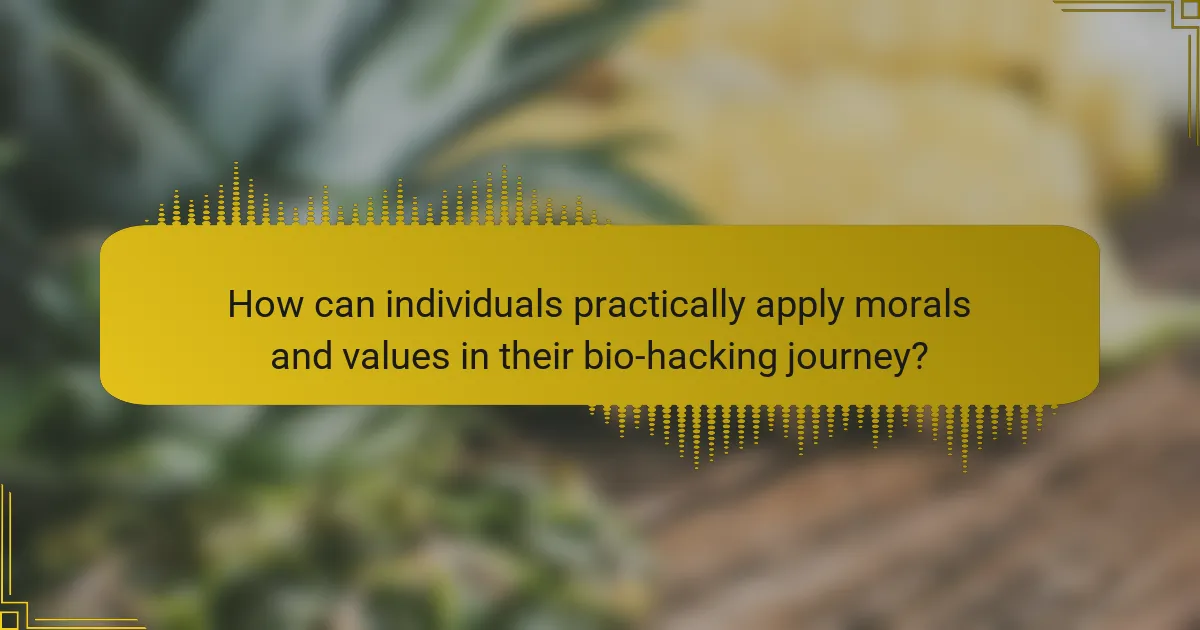
How can individuals practically apply morals and values in their bio-hacking journey?
Individuals can apply morals and values in bio-hacking by prioritising ethical practices and personal integrity. This involves assessing the impact of bio-hacking methods on mental and physical health, ensuring they align with personal beliefs. For example, choosing natural supplements over synthetic options reflects a commitment to holistic health. Additionally, setting clear intentions based on core values can guide decision-making, fostering a transformative journey that respects both self and community. Engaging in self-reflection helps maintain alignment with these morals and values throughout the bio-hacking process.
What best practices should be followed for integrating mind-body practices into daily life?
Integrating mind-body practices into daily life enhances personal transformation. Start with consistent mindfulness exercises, such as meditation or yoga, to cultivate awareness. Schedule regular breaks for deep breathing or stretching to reduce stress. Incorporate bio-hacking techniques, like tracking sleep patterns, to optimise health. Engage in reflective journaling to clarify values and goals, fostering alignment with personal morals. Lastly, create a supportive community for accountability and shared growth.
What common mistakes should be avoided when bio-hacking for personal transformation?
To avoid common mistakes in bio-hacking for personal transformation, prioritise a balanced approach that respects both morals and values. Focus on sustainable practices rather than quick fixes. Ensure that changes align with personal ethics and well-being. Avoid ignoring scientific evidence; rely on credible sources to guide your methods. Lastly, do not neglect mental health; emotional well-being is crucial for effective transformation.
How to set achievable goals for personal transformation?
To set achievable goals for personal transformation, focus on specific, measurable, attainable, relevant, and time-bound (SMART) objectives. Break down larger aspirations into smaller, manageable tasks.
Incorporate mind-body practices such as meditation and yoga, which enhance self-awareness and motivation. Bio-hacking techniques, like tracking progress and adjusting habits, can optimise personal growth.
Regularly reassess goals to ensure they align with evolving values and morals. This iterative process fosters resilience and adaptability, essential for lasting transformation.
What resources are available for learning about mind-body practices?
Various resources exist for learning about mind-body practices, including books, online courses, workshops, and community groups. Books like “The Body Keeps the Score” provide foundational knowledge. Online platforms such as Coursera and Udemy offer structured courses. Workshops facilitate hands-on experience, while local community groups foster practice and discussion. Engaging with these resources enhances personal transformation through mind-body practices.
What are the signs of progress in personal transformation?
Signs of progress in personal transformation include increased self-awareness, improved emotional regulation, and enhanced resilience. Individuals may notice positive changes in their decision-making and relationships. Engaging in mind-body practices and bio-hacking can accelerate these transformations. Tracking metrics such as stress levels, energy, and overall well-being provides tangible evidence of growth.